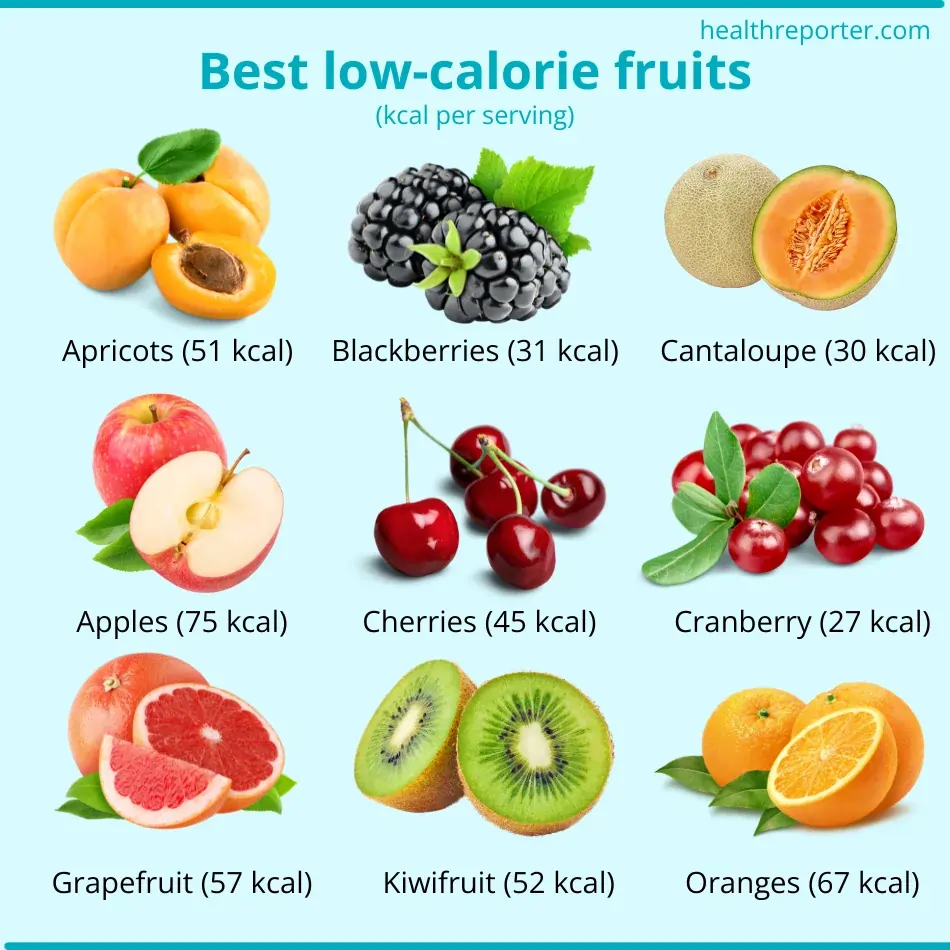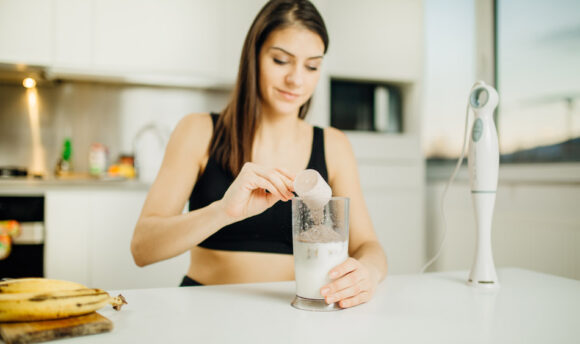Low-Calorie Fruits: 20 Light and Luscious Options
The diet-friendly fruit basket: discover low-calorie options for a healthy lifestyle

You may have heard the misconception that the sugar in fruit is just as bad as the sugar in soda and if you eat fruit every day, it will make it harder to drop the extra pounds. However, we’re here to set the record straight.
While some fruits do contain higher sugar content, they’re also rich in dietary fiber that helps regulate blood sugar. More importantly, fruits are packed with essential nutrients vital for combating chronic diseases and are a key component of a balanced diet.
In fact, diving into the vibrant world of fruit doesn’t mean you have to compromise on your calorie goals. Join us as we explore 20 of the best low-calorie fruits that let you enjoy nature’s sweetness and still watch those inches.

#1 Apples
Although sugars are responsible for most of the apple calories, the fruit’s fiber content is relatively high, especially if you eat the skin. This fiber not only promotes gut health but also aids in controlling cholesterol levels.
Beyond just being a low-calorie fruit, apples are enriched with vitamin C and essential minerals like magnesium and potassium. Together, these nutrients contribute to several health benefits, such as improved immune function and good bone health.
Recommended serving size: 1 small apple (4.5oz)
Calories per serving of Granny Smith apple: 75kcal
#2 Apricots
Apricots are rich in beneficial plant chemicals, including antioxidants, carotenoids, flavonoids, and phenolic compounds.
Scientific studies have shown that stone fruits not only bolster the immune system but also diminish oxidative stress. Their benefits extend to safeguarding eye health and reducing the risk of ailments like heart disease and certain cancers.
Recommended serving size: 3 apricots (3.7oz)
Calories per serving of apricots: 50.4kcal
#3 Blackberries
Blackberries are nutrient-dense fruits containing high concentrations of bioactive compounds, minerals, and vitamins, including vitamin C.
There are numerous health benefits associated with including blackberries in your weight loss diet. The nutrients in these small fruits have anti-inflammatory properties and may prevent heart disease, improve brain health, and boost the immune system.
Recommended serving size: ½ cup or 8 blackberries (2.5oz)
Calories per serving of blackberries: 31kcal
#4 Blueberries
Blueberries contain a high concentration of plant pigments called anthocyanins, which have been shown to support weight loss. Studies also show that these vibrant berries have demonstrated the potential to reduce the risk of cardiovascular disease and type 2 diabetes while also promoting brain health.
Recommended serving size: ½ cup (2.6oz)
Calories per serving of blueberries: 42.2kcal
#5 Cantaloupe
Cantaloupe, with its rich content of vitamin C, vitamin A, lycopene, folate, and potassium, makes it an ideal addition to a weight loss diet. Regular consumption of the fruit may help reduce the risk of cancer and heart disease and regulate blood pressure.
Recommended serving size: ½ cup, diced (3.1oz)
Calories per serving of cantaloupe: 30kcal
#6 Cherries
Research suggests that the vitamin C found in cherries can reduce exercise-induced muscle soreness and hypertension. These stone fruits have a low glycemic index, controlling blood sugar levels and reducing HBA1c levels in people with diabetes.
Recommended serving size: 9 cherries (2.2oz)
Calories per serving of cherries: 44.7kcal
#7 Cranberries
Cranberries are a low-calorie, nutrient-dense fruit you can enjoy as a snack to satisfy your sweet tooth or add to a breakfast cereal instead of refined sugar.
There are several proven health benefits of including cranberries in your diet. Their nutrients help manage high blood pressure, improve sugar and fat metabolism, reduce oxidative stress and inflammation, and promote cardiovascular health.
Recommended serving size: ½ cup (2oz)
Calories per serving of fresh cranberries: 26.7kcal
#8 Grapefruit
Grapefruit is frequently recommended as a weight loss food. However, this fruit’s calories don’t stand alone. People who eat grapefruit have been shown to have higher intakes of dietary fiber, vitamin C, potassium, and magnesium.
Including grapefruit in your diet can bolster weight loss, elevate good cholesterol levels, and lower blood pressure. Its anti-inflammatory properties further contribute to a decreased risk of heart disease.
Recommended serving size: ½ medium grapefruit (5.5oz)
Calories per serving of grapefruit: 57kcal
#9 Grapes
Grapes have a low glycemic index, and eating a small portion of 10–14 grapes won’t result in a large spike in blood sugar.
Due to their natural sweetness, grapes are a good choice for satisfying your sweet tooth and can be enjoyed as part of a healthy diet. They are also rich in bioactive plant chemicals and are effective in managing cardiovascular disease and blood pressure.
Recommended serving size: 10 grapes (2.5oz)
Calories per serving of grapes: 62kcal
#10 Kiwi
The exceptionally high vitamin C content in kiwi fruits is recognized as the reason this low-calorie fruit offers significant benefits for cardiovascular health and sugar metabolism.
Additionally, the high fiber content in kiwis promotes gut health, making them a well-rounded addition to any diet.
Recommended serving size: 2 small kiwi fruits (2.8oz)
Calories per serving of kiwi fruit: 51.2kcal
#11 Limes
Similar to other citrus fruits, limes contain high levels of vitamin C and other nutrients such as B-group vitamins, potassium, and phosphorus, which are known to promote heart health. They also contain enzymes that have been shown to support weight loss and reduce body fat.
Recommended serving size: 1 lime (2.4oz)
Calories per serving of lime: 20.1kcal
#12 Mangoes
Mango is an excellent addition to your weight loss diet when eaten in small portions. The fruit is rich in several potent antioxidant and anti-inflammatory nutrients, which offer significant health benefits. Eating mangoes may help prevent cancer, cardiovascular disease, the effects of aging, and cognitive disorders.
Recommended serving size: ½ cup (2.9oz)
Calories per serving of diced mango: 49.8kcal
#13 Nectarines
Low in calories and high in antioxidants, including vitamin C and vitamin A, eating nutrient-dense nectarines offers protection against chronic diseases. As such, some researchers consider the low-calorie stone fruits a functional food.
Recommended serving size: 1 medium nectarine (5oz)
Calories per serving of nectarine: 62.3kcal
#14 Oranges
An average orange contains the daily recommended intake of 60mg of vitamin C. Increasing your intake of this vitamin can give your immune system a boost. Vitamin C also acts as a potent antioxidant that helps protect the body from damage caused by free radicals.
Recommended serving size: 1 small orange (4.9oz)
Calories per serving of orange: 67.1kcal
#15 Papaya
The nutrient density of papaya makes it a health-promoting fruit, and its low calorie content means it can be included in a weight loss diet. The essential vitamins and phytonutrients in papaya play a role in managing inflammation, high blood glucose levels, and hypertension, potentially aiding in cancer prevention.
Recommended serving size: ½ cup of diced papaya (5.1oz)
Calories per serving of papaya: 62.3kcal
#16 Pears
Ensure you eat pears with the skin on to benefit from the range of potent flavonoids and other bioactive plant chemicals. Not only have scientific studies found that they promote a healthy weight, but they may also reduce the risk of diabetes, high cholesterol, and cancer.
Recommended serving size: 1 small pear (4.2oz)
Calories per serving of pear: 68.4kcal
#17 Plums
Fresh plums and prunes (the dried version) are low in calories and rich in anti-inflammatory and antioxidant nutrients. As a result, they have anti-allergic properties, and eating them regularly can improve heart, brain, and bone health.
Recommended serving size: 2 plums (3.8oz)
Calories per serving of plums: 50.6kcal
#18 Raspberries
Whether you eat them fresh from the tree in your garden, with yogurt as a snack, or frozen and blended into a healthy smoothie, raspberries are packed full of health-supporting nutrition. These very low-calorie fruits add a bit of sweetness to your diet when trying to lose weight and boost immunity.
Recommended serving size: ½ cup (2.2oz)
Calories per serving of raspberries: 33.8kcal
#19 Strawberries
The phytochemicals in strawberries, as well as their high vitamin C and folic acid content, are responsible for their anti-oxidant and anti-inflammatory properties. Eating strawberries is also associated with lower blood pressure, cholesterol, and blood glucose.
As one of the lowest-calorie fruits, strawberries can be included in your diet for weight loss as a snack, chopped into your breakfast cereal, or blended with yogurt and other ingredients to make a healthy, low-calorie smoothie.
Recommended serving size: ½ cup (2.9oz)
Calories per serving of strawberries: 26.6kcal
#20 Watermelon
Last but not least, watermelon is a juicy, guilt-free snack for anyone following a calorie-controlled diet. Apart from the bioactive plant chemicals in watermelon that protect against heart disease, obesity, diabetes, and cancer, the fruit is a source of several amino acids.
Studies suggest that watermelon not only improves your overall health but also makes an excellent addition to a weight loss diet.
Recommended serving size: ½ cup of diced watermelon (2.7oz)
Calories per serving of watermelon: 22.8kcal
A Word From Our MD


Eating fruit can make your weight loss journey more enjoyable. They are an essential component of a healthy diet due to the dietary fiber, phytonutrients, vitamins, and minerals they contain.
As a result, fruit offers several health benefits, which is the reason fruit is included in all the best weight loss diets. Nutrient-dense fruits may even reduce the risk of chronic conditions such as type 2 diabetes and high blood pressure.
While fruits are beneficial, achieving weight loss requires an overall calorie deficit. Low-calorie foods, including low-calorie fruit, can help you manage your intake and promote weight loss. For those whose metabolism requires a boost, there are weight loss supplements you can try as well.
However, it’s crucial to remember that portion size is a critical factor in limiting your calories, as even the calories in low-calorie foods add up. Using weight loss apps may be a helpful tool in determining your ideal portion sizes.
That said, any significant dietary changes should always be made in consultation with a medical professional to ensure optimal health and results.
FAQs
No, fruits are not calorie-free. However, many fruits have a low calorie content, making them a good choice when on a weight loss journey.
The lowest-calorie fruits, such as strawberries, cranberries, and watermelon, are best for weight loss.
Higher-sugar fruits such as bananas, pineapples, and mangoes should be limited in your weight loss diet but can be included in small portions.
Yes, eating fruit breaks a fast. The sugar in fruit raises blood sugar levels, causing your cells to switch back to burning glucose for energy instead of fat.
Conclusion
While it’s vital to reduce your calories and consume less sugar when trying to lose weight, fruits such as crisp apples, deep red raspberries, and juicy oranges won’t blow your sugar budget.
Low-calorie fruits are a tasty and nutritious addition to a healthy diet. Most are nutrient-dense, naturally sweet, and have a high fiber content, which makes them a smart choice for anyone trying to manage their weight and improve overall health.

















































 Select your language:
Select your language: 









